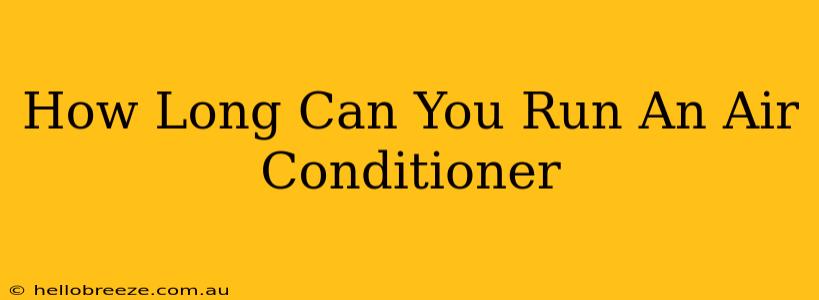Summer heat can be relentless, and your air conditioner is your best friend during those scorching days. But how long is too long to run your AC? This comprehensive guide explores the factors influencing runtime, potential issues, and best practices for maximizing efficiency and lifespan.
Understanding Your AC's Capabilities
The question "How long can you run an air conditioner?" doesn't have a simple yes or no answer. It depends on several factors:
-
AC Unit Size: A properly sized unit for your space will run more efficiently and for longer periods without strain. An undersized unit will work constantly and struggle to cool your home effectively, potentially leading to premature failure. Conversely, an oversized unit will cycle on and off frequently, leading to inconsistent cooling and higher energy bills.
-
Climate and Ambient Temperature: In extremely hot and humid climates, your AC might need to run longer to maintain a comfortable temperature. Conversely, milder climates may require shorter runtimes.
-
Insulation and Sealing: A poorly insulated home loses cool air rapidly, forcing your AC to work harder and longer to compensate. Proper sealing around windows and doors is crucial to prevent air leaks.
-
Usage Patterns: The number of people in your home, the use of appliances generating heat (ovens, dryers), and the amount of sunlight entering your house all impact how long your AC needs to run.
-
Maintenance: Regular maintenance, including filter changes and professional servicing, ensures your AC operates efficiently and prevents premature wear and tear. A well-maintained unit will run longer without issues.
How Long is Too Long?
There's no magic number of hours you shouldn't run your AC. The goal is to maintain a comfortable temperature efficiently. If you notice your AC running constantly without adequately cooling your home, it might indicate a problem. Signs of potential issues include:
-
Cycling Problems: Your AC should cycle on and off regularly. If it runs constantly, there's likely an issue with the unit's functionality or a problem with your home's insulation or sealing.
-
Unusual Noises: Loud noises, such as grinding or clicking, could indicate mechanical problems requiring professional attention.
-
Weak Airflow: Reduced airflow suggests a problem with your filters, coils, or other components.
-
High Energy Bills: Significantly higher electricity bills than usual could be a sign of an inefficient AC unit or a problem that needs addressing.
Tips for Efficient AC Usage
To maximize your air conditioner's lifespan and efficiency, follow these guidelines:
-
Regular Maintenance: Change air filters every 1-3 months, depending on usage and climate. Schedule professional maintenance annually.
-
Proper Sealing and Insulation: Address air leaks around windows and doors, and ensure your home has sufficient insulation.
-
Strategic Use of Blinds and Curtains: Keep sunlight out during peak heat hours to reduce the workload on your AC.
-
Set Your Thermostat Efficiently: Aim for a temperature that's comfortable yet energy-efficient. Consider using a programmable thermostat to automate temperature settings.
When to Call a Professional
If you suspect a problem with your air conditioner, don't hesitate to call a qualified HVAC technician. Ignoring issues could lead to costly repairs or even complete unit failure. Signs you need professional help include:
- Frequent cycling problems
- Unusual noises
- Weak or uneven airflow
- Leaking refrigerant
- Frozen evaporator coil
By understanding your AC unit's capabilities and implementing these best practices, you can enjoy cool comfort throughout the summer without compromising the longevity and efficiency of your air conditioning system. Remember, prevention is key to keeping your AC running smoothly for years to come.

